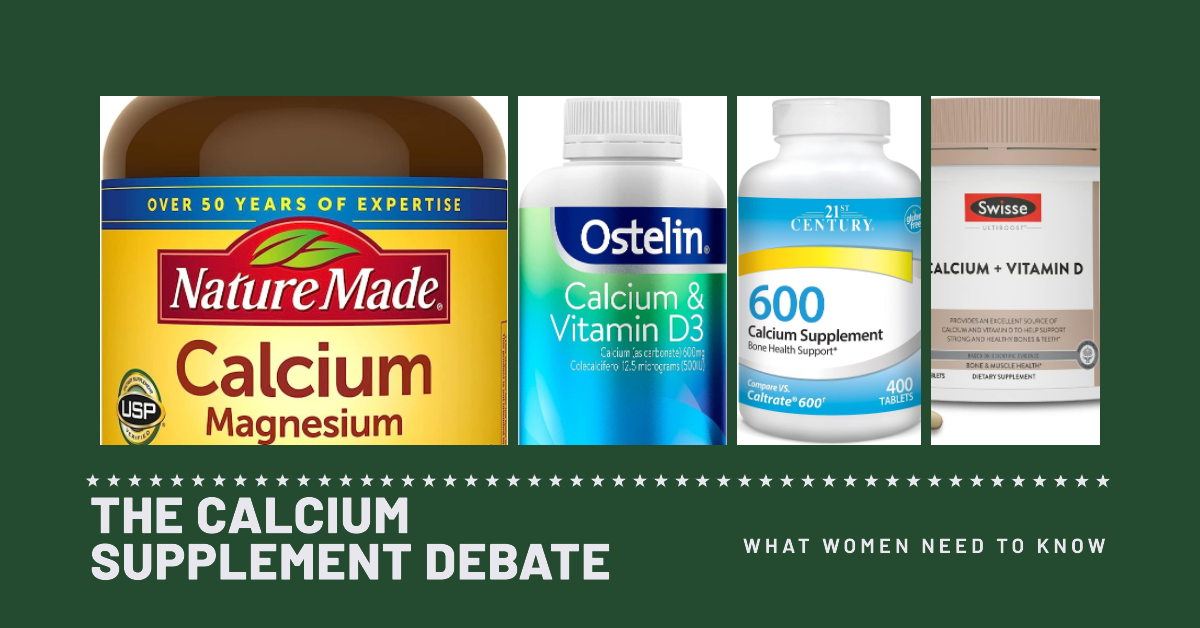Introduction
Calcium supplements women’s health is a topic of great importance. As women age, the need for calcium increases, making supplements a vital part of their daily regimen. When it comes to calcium supplements, women’s health cannot be overlooked. Women have specific calcium needs, especially during phases like pregnancy, post-menopause, and during their monthly cycles. Calcium supplements play a crucial role in ensuring that these needs are met, promoting bone health and reducing the risk of osteoporosis. In the realm of calcium supplements women’s health options are vast, with various brands and compositions available in the market
Ever found yourself pondering the real value of calcium supplements in a woman’s diet? Women’s Health: The Calcium Supplement Debate brings light to this contentious issue. In this riveting dialogue, you’ll explore the latest research on calcium supplements and how they affect the overall health of women. You’ll find comprehensive insights into not only the benefits but also the potential drawbacks and risks, helping you make a well-informed decision for your health. Get ready to challenge what you thought you knew about calcium supplements.
Understanding Calcium and Its Function
Hey there! Have you ever thought about how calcium plays a vital role in your day-to-day activities? Without this mineral, your body could not perform many of its basic functions.
Definition of Calcium
So, what exactly is calcium? Calcium is a white, lustrous, chemical element that is vital for the functioning of any living organism. This versatile nutrient is abundant in your bones and teeth but also circulates throughout the bloodstream, where it aids in sending signals between the brain and the rest of the body.
Roles of Calcium in the Body
Ostelin Calcium & Vitamin D is more than just a calcium supplement. With Vitamin D3, it not only promotes bone health but also supports the immune system. This dual-action makes it a top choice for women looking to strengthen their bones and boost their immunity.

Photo: Amazon
You may already know that this robust mineral keeps your bones strong, but did you know that it regulates muscle contractions, including your heartbeat? It’s also essential in helping your blood clot correctly. In short, from nerve signal transmission to energy metabolism, calcium is the silent regulator working to keep your body in check.
Impact on Women’s Health
When it comes to women’s health, calcium holds significant weight. Women are more susceptible to certain conditions such as osteoporosis, particularly during menopause, when a decrease in estrogen levels makes it difficult to maintain bone density. Regular calcium intake can lower the risk and severity of these conditions, hence its importance cannot be undermined.
Calcium Requirement in Women
Understanding calcium requirements is crucial in ensuring that your diet includes enough of this foundational nutrient.
Calcium Requirement in Different Women’s Life Stages
Women’s calcium needs vary in different stages of life. During puberty, the rapid growth spur requires increased intake. In adulthood, women need to maintain calcium deposits to support bone health and prevent diseases like osteoporosis. The need escalates during pregnancy and lactation to meet the demand for fetal bone development.
Factors Affecting Calcium Needs in Women
Several factors can affect the requirement. Age is one factor, with growing children and older adults needing more calcium. Pregnancy and breastfeeding also increase the need. Some chronic conditions such as Vitamin D deficiency, lactose intolerance, or intestinal disorders might impair your body’s ability to digest or absorb calcium.
Consequences of Insufficient Calcium Intake
Insufficient calcium can lead to weakened bones, leading to conditions like osteoporosis or osteopenia. It may also cause muscle cramps, abnormal heart rhythms, and delayed growth in children. Therefore, maintaining a steady intake of calcium is essential for your overall health.
Food Sources and Calcium Absorption
Looking for great sources of calcium in your diet? Here’s what you need to know about its absorption and the role Vitamin D plays.
Best Food Sources of Calcium
Dairy products like milk, cheese, and yogurt are excellent sources of calcium. Non-dairy sources include leafy green vegetables like kale and broccoli, and fortified products like almond milk and tofu. A variety of fish like salmon and sardines, legumes, and nuts are also dense in calcium.
Factors Affecting Calcium Absorption
While having calcium-rich foods is important, certain things may affect how much of the calcium you absorb. Factors such as the presence of Vitamin D, the amount of calcium in your diet, your age and health condition can all impact calcium absorption.
Importance of Vitamin D in Calcium Absorption
Vitamin D is a crucial player in calcium absorption as it helps to increase the amount of calcium your gut can absorb from food. Without sufficient vitamin D, your body struggles to take in enough calcium, even if you’re eating a calcium-rich diet.
The Use of Calcium Supplements
Sometimes, the diet might not provide enough of this crucial nutrient, and that’s where supplements come in.
Reasons for Using Calcium Supplements
People opt for calcium supplements for a variety of reasons. Some have a diet that falls short of this crucial mineral, while others might not be able to properly absorb it from their diet due to various health conditions or age. In such cases, taking a daily supplement helps in meeting the required calcium levels.
Different Forms of Calcium Supplements
Calcium supplements come in a variety of forms from tablets, capsules, chewable candies, to liquids and powders. The two most common types are calcium citrate and calcium carbonate. It’s important to understand the form that suits your body’s absorption ability best.
Importance of Doctor’s Advice in Taking Calcium Supplements
While supplements can be a helpful way to meet your body’s needs, it is crucial to seek a doctor’s advice before starting any supplemental regimen. Your physician can guide you on the appropriate dosage and form and also alert you on any potential interactions with other medications you may be taking.
The Pros of Calcium Supplements
The world of supplements may seem a little murky, but there are some undeniable benefits related to the use of calcium supplements.
Benefits of Calcium Supplements to Women’s Health
Calcium supplements can have several benefits especially for women’s health. Regular intake can prevent osteoporosis, aid in weight loss, reduce the risk of colon and rectal cancer, and also alleviate premenstrual syndrome.
Situation in Which Calcium Supplements are Necessary
Supplements can prove beneficial in certain conditions where dietary intake is insufficient, or absorption from food is impaired. They are also recommended for women during pregnancy or lactation, women over 50 who are prone to bone density loss, and those diagnosed with lactose intolerance or gut disorders.
Studies Supporting Calcium Supplements
Several studies have demonstrated the effectiveness of calcium supplements in promoting bone health, reducing the likelihood of fractures in older adults, and preventing the onset of osteoporosis. Thus, the evidence supports the use of supplements when dietary intake is inadequate.
The Cons of Calcium Supplements
While supplements may seem like an easy solution, they might not be risk-free. It’s important to consider these potential downsides.
Lastly, Swisse Calcium with Vitamin D Supplement offers a blend of calcium citrate, calcium carbonate, and Vitamin D3. This combination ensures that you get the benefits of different calcium sources along with the advantages of Vitamin D3 for better calcium absorption. It’s a comprehensive solution for both women and men.

Photo: Amazon
Potential Risks and Side Effects
Like any other dietary supplements, calcium supplements might also have some side effects. These might vary from minor issues such as bloating, gas, or constipation to more serious problems like kidney stones.
Circumstances where Calcium Supplements May Be Harmful
Overuse or unnecessary use of calcium supplements could potentially be harmful. It might lead to hypercalcemia, a condition characterized by excess calcium in the blood which could affect kidney function and lead to kidney stones. People with certain health conditions, including heart disease and sarcoidosis, should be particularly cautious.
Studies Against Calcium Supplements
A few studies have raised concerns about potential links between calcium supplements and heart disease. These researches suggest that excess calcium from supplements might deposit in the arteries rather than being absorbed by the bones, which could lead to heart diseases.
Assessing the Calcium Supplement Debate
In light of the differing viewpoints, it might get confusing whether to include calcium supplements in your diet or not. Let’s break it down.
Summary of Arguments and Counterarguments
On one side, proponents argue that calcium supplements are an effective way to prevent osteoporosis and fractures. Contrarily, skeptics point to potential risks and side effects, including kidney stones and possible links to heart disease.
Health Professionals’ Opinions
Health professionals often recommend dietary changes as the first line of defence for meeting calcium needs. However, they also acknowledge that certain health conditions or dietary restrictions may necessitate the use of supplements.
Ongoing Research on Calcium Supplements
The debate continues as researchers conduct studies to establish a clearer understanding of the relationship between calcium supplements, cardiovascular health, and overall mortality. So, the jury is still out on this one!
21st Century Calcium Supplement offers a whopping 600 mg of calcium in each serving. With a pack of 400 tablets, it ensures that you have a long-lasting supply to support your bone health. Given the significance of calcium in preventing osteoporosis, this supplement is a reliable choice.

Photo: Amazon
Alternative Ways to Meet Calcium Needs
The discussion on calcium doesn’t end with supplements. Here’s how you can meet your calcium needs through other means.
Relying on Diet for Calcium Intake
A balanced diet can typically provide all the calcium you need. By including a variety of dairy and non-dairy calcium sources in your meals, you can maintain optimal bone health and limit your need for supplements.
Lifestyle Changes for Better Calcium Absorption
Boosting the efficiency of calcium absorption can be undertaken through lifestyle changes. Regular exercise and refraining from excessive caffeine or alcohol can work wonders. Moreover, getting enough sunlight can help in Vitamin D synthesis which promotes calcium absorption.
Non-dairy Sources of Calcium
If you’re lactose intolerant or following a vegan diet, not to worry! Non-dairy sources such as fortified plant-based milks, tofu, leafy greens, and various types of fish can match up the calcium content of their dairy counterparts.
Calcium and Other Health Concerns
Adequate calcium intake is not just about bones. It plays a key role in preventing several serious health conditions.
Calcium and Osteoporosis
Osteoporosis, characterized by weak and brittle bones, is often caused by insufficient calcium intake. Regularly consuming an adequate amount of calcium can reduce the risk of developing this disease, particularly in postmenopausal women.
Calcium and Cardiovascular Disease
While some studies indicate a potential link between calcium supplements and heart disease, calcium itself is essential for the proper functioning of your heart. It aids in the contraction of heart muscles and ensures a regular rhythm. However, the key here is balance – while too little can harm your bones, too much might contribute to heart disease.
Relationship of Calcium with Other Nutrients and Health Conditions
Calcium doesn’t work alone. It goes hand in hand with various other nutrients, notably Vitamin D which is crucial for its absorption. Interplay between calcium and other nutrients, such as Vitamin K and phosphorus, also contributes to bone health and metabolism. Calcium imbalances might also indicate broader health issues such as kidney disease or hormonal disorders.
Final Thoughts and Recommendations
While the calcium supplement debate doesn’t have a definitive winner, some things are clear.
Striking a Balance in Calcium Intake
Like most things, balance is key when it comes to calcium. Consuming too much or too little can lead to health problems, so it’s essential to strive for the right balance that meets your body’s demands.
Diversifying the sources of calcium and combining it with other essential minerals can be beneficial. Nature Made Calcium Magnesium Zinc Tablets do just that. Enriched with Vitamin D, this supplement ensures optimal absorption of calcium while providing the added benefits of magnesium and zinc.

Photo: Amazon
General Recommendations for Women’s Health
A combination of a calcium-rich diet, regular exercise, and adequate sunshine ideally meets calcium needs for most women. But, for those unable to meet the daily requirement, after consultation with a healthcare professional, supplements may be useful.
Need for Personalized Assessment
A blanket solution or a one-size-fits-all strategy may not be the best approach when determining calcium requirements. A personalized assessment considering your age, dietary preferences, health status, lifestyle, and stage in life is essential.
So there you have it – a comprehensive look at calcium, its role in women’s health, the controversy surrounding supplements, and our thoughts around this debate. Listen to your body and your healthcare provider to make the right choices for your health.
Disclaimer
Please keep in mind that nothing said here should be construed as a substitute for professional medical or financial advice from a qualified financial advisor or a licensed healthcare provider. If you use pharmaceuticals or have concerns after reading the above review information, be sure to speak with a qualified physician or financial expert before making any purchasing decisions. Since the claims made about these products have not been reviewed by the Food and Drug Administration or Health Canada, individual outcomes may differ and cannot be guaranteed. Research that has been approved by the FDA or Health Canada has not attested to the efficacy of these products. These goods do not offer any form of get-rich-quick scheme and are not designed to diagnose, treat, cure, or prevent any ailment. The reviewer disclaims all liability for incorrect pricing. For exact prices, view the product sales page



